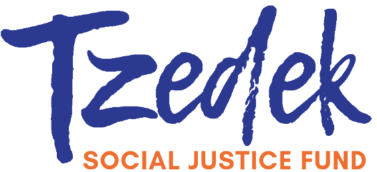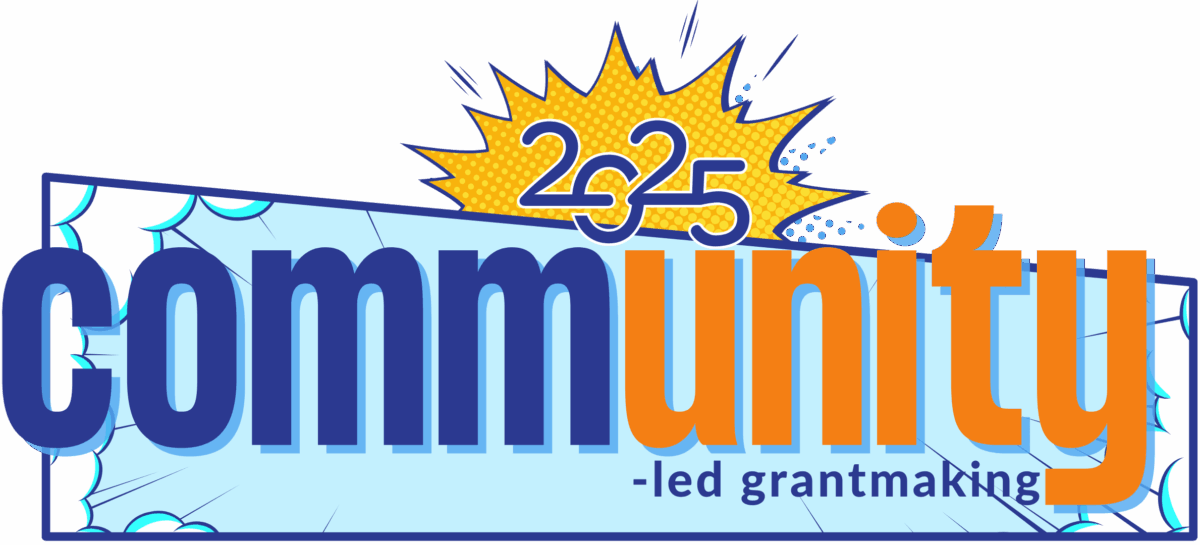Available in English

¡YA ABIERTO!
El CLGC ya no acepta solicitudes para su solicitud de propuesta de 2025. Se notificará a los solicitantes la decisión el 27 de octubre.
¡HAZ CLIC EN LOS ENCABEZADOS PARA MÁS INFORMACIÓN!
Panorama general de CLG
¿Qué es CLG?
La concesión de subvenciones dirigida por la comunidad (CLG, por sus siglas en inglés) es un enfoque participativo para otorgar subvenciones que reconoce y valora el conocimiento comunitario y que traslada el poder de toma de decisiones a las personas de la comunidad que se ven más afectadas por la opresión en nuestras comunidades.
CLG sigue el principio de «nada sobre nosotres sin nosotres», al tiempo que reconoce que muchos de los problemas sociales en Estados Unidos y en nuestra región se deben a la falta de acceso a recursos y apoyo para implementar soluciones, y no a una falta de sabiduría o conocimientos por parte de la comunidad afectada.
Al trasladar el poder de toma de decisiones a les miembres de comunidades y dirigir los flujos de recursos directamente hacia nuestras comunidades, CLG busca encontrar soluciones a las inequidades en nuestras comunidades, preguntándole directamente a la gente cuáles serían las soluciones que mejor funcionarían para elles.
CLG @ Tzedek
A través de este programa, el Comité de Concesión de Subvenciones Dirigida por la Comunidad (CLGC o «el Comité»), facilitado por la Directora de Concesión de Subvenciones Liderada por la Comunidad de Tzedek, redistribuye un mínimo de $250,000 en subvenciones en el área de Asheville. La estrategia de CLG en Tzedek representa un cambio en el poder de toma de decisiones: del personal de Tzedek hacia líderes comunitaries locales. A través de la concesión de subvenciones dirigida por la comunidad, nosotres redistribuimos fondos a organizaciones sin fines de lucro, grupos de base y de movimiento, y colectivos comunitarios con patrocinio fiscal que trabajan en las áreas prioritarias de Tzedek: justicia racial, justicia LGBTQ y desmantelamiento del antisemitismo.
Funciones y responsabilidades del CLGC
El Comité CLG está formado por les miembres que ya trabajan en las áreas prioritarias y las comunidades regionales de Tzedek. Este grupo de cinco personas colabora con la Directora de Concesión de Subvenciones Dirigida por la Comunidad en la creación de un proceso participativo que permite elaborar un análisis colectivo sobre la redistribución de la riqueza, nuestras áreas prioritarias, el cambio de sistemas y la recuperación de la comunidad. El Comité CLG diseña y aplica procesos que incluyen: el proceso de solicitud de subvenciones, el proceso de toma de decisiones y los procesos de concesión de subvenciones.
El proceso del CLGC
Les miembres del CLGC que trabajan en comunidades de Asheville y la región circundante identifican un enfoque para el proceso de concesión de subvenciones. Después de identificar el área de enfoque, el Comité desarrolla el proceso de concesión de subvenciones en alineación con la misión de Tzedek, la lista de verificación de concesión de subvenciones y los valores y prácticas de la organización. Una vez que el diseño del proceso está completo, se anuncia la apertura del proceso de concesión de subvenciones. El proceso de solicitud puede variar dependiendo de la cohorte de CLG. Si el diseño del CLGC es un proceso de solicitud abierto, compartiremos toda la información en nuestro sitio web, lo anunciaremos por correo electrónico y publicaremos información en nuestras páginas de redes sociales.
¡Conoce a la familia CLG!
Selección del CLGC 2024-2025
Para este Comité CLG, Tzedek quiso evitar crear una sensación de competencia entre les miembres de comunidades y llegar a un público más allá de quienes podrían considerarse líderes comunitaries, priorizando a personas con experiencia vivida de opresión racial, LGBTQ+ y antisemita. Tzedek se reunió con organizaciones socias comunitarias y con organizaciones beneficiarias de Tzedek para recopilar nombres de posibles miembres del comité que pudieran dedicar tiempo a nuestro Comité. Después de conversar con un pequeño grupo de personas para conocer su interés y disponibilidad, ¡formamos nuestro Comité!
Conoce al CLGC 2024-2025
Lex Turnbull es une artiste queer y miembre de la comunidad cuyo trabajo se basa en cómo nos comunicamos, navegamos, deconstruimos y reconstruimos las fronteras. Durante la última década, elle ha participado en la organización comunitaria de base en diversas funciones, desde apoyar a personas LGBTQIA+ encarceladas hasta construir espacios creativos sostenibles en WNC. Como sureñe de toda la vida, su enfoque se ha centrado en cómo resistir a los sistemas opresivos para crear un entorno más solidario en el que existir. Como artiste y miembre de la comunidad, luchar contra estas injusticias, por pequeñas que sean, es donde elle encuentra su manera de contribuir a un cambio tangible.


Lisa Forehand es una organizadora impulsada por la justicia, ministra interreligiosa y facilitadora experimentada, afincada en Asheville desde 1999. Criada en un hogar culturalmente judío, Lisa aporta un compromiso de toda la vida con la exploración espiritual, la conexión intercultural y la construcción comunitaria. Ha vivido y trabajado en más de ocho países y pasó más de una década en The Community Foundation of WNC, donde ayudó a lanzar iniciativas transformadoras como Hispanics in Philanthropy y Women for Women. Con un máster en Administración Intercultural y un profundo amor por la gente y el lugar, Lisa se presenta con calidez, sabiduría y una pasión por fortalecer las relaciones, las organizaciones sin fines de lucro y los movimientos en todo el oeste de Carolina del Norte.
Luisa Rodriguez es una defensora nacida en Venezuela cuya trayectoria ha estado moldeada por una profunda creencia en la justicia, la conexión y la sanación colectiva. Tras salir de Venezuela hace nueve años en busca de seguridad y libertad, se ha mantenido fiel a los valores que le transmitió su amada abuela: amor, fortaleza y dignidad inquebrantable. Con formación en derecho y una pasión por los derechos humanos, Luisa considera que la comunidad es esencial para nuestra supervivencia y crecimiento. Amante de la naturaleza, los animales y las amistades profundas, también recurre al arte como refugio y como una manera de dar sentido al mundo. La empatía, el amor y la esperanza guían su camino hacia adelante..


Sanii Thomas es un espíritu creativo y comunitario que ha hecho de Asheville su hogar durante los últimos 16 años. A sus 21 años, ella siente pasión por elevar a otras personas, crear espacios llenos de positividad y fomentar el crecimiento tanto personal como colectivo. Sanii lidera con intención y cuidado en todo lo que hace. Ya sea conectando con la gente, apoyando iniciativas locales o simplemente compartiendo buenas vibraciones, ella aporta corazón y autenticidad a cada momento. Su misión es sencilla: inspirar, elevar y ayudar a construir comunidades más fuertes y compasivas, día a día y persona a persona.
Toshia Sitton Toshia Sitton es una residente de Asheville de toda la vida, madre de tres y orgullosa abuela de cuatro. Desde criar a sus hijes en vivienda pública hasta convertirse en un pilar del liderazgo en la comunidad, su trayectoria siempre se ha centrado en el amor, la resiliencia y la posibilidad. Durante años, Toshia abrió su hogar como refugio seguro para la juventud del vecindario, ofreciendo estructura, apoyo y alegría a través de programas como entrenamiento de majorettes y recorridos universitarios. Anteriormente se desempeñó como Coordinadora de Participación Comunitaria en Read To Succeed y actualmente forma parte de los comités United 4 Youth y Tzedek. Elevar a la juventud y abogar por un cambio duradero no es solo su pasión: es su propósito.
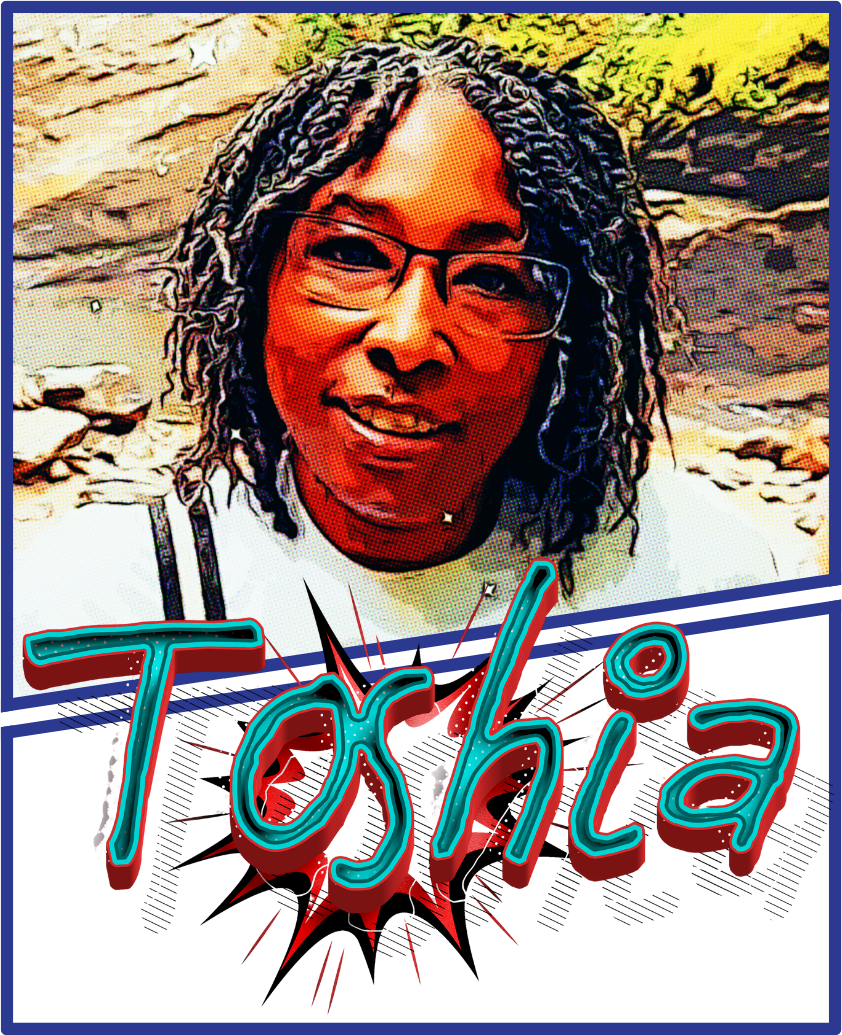
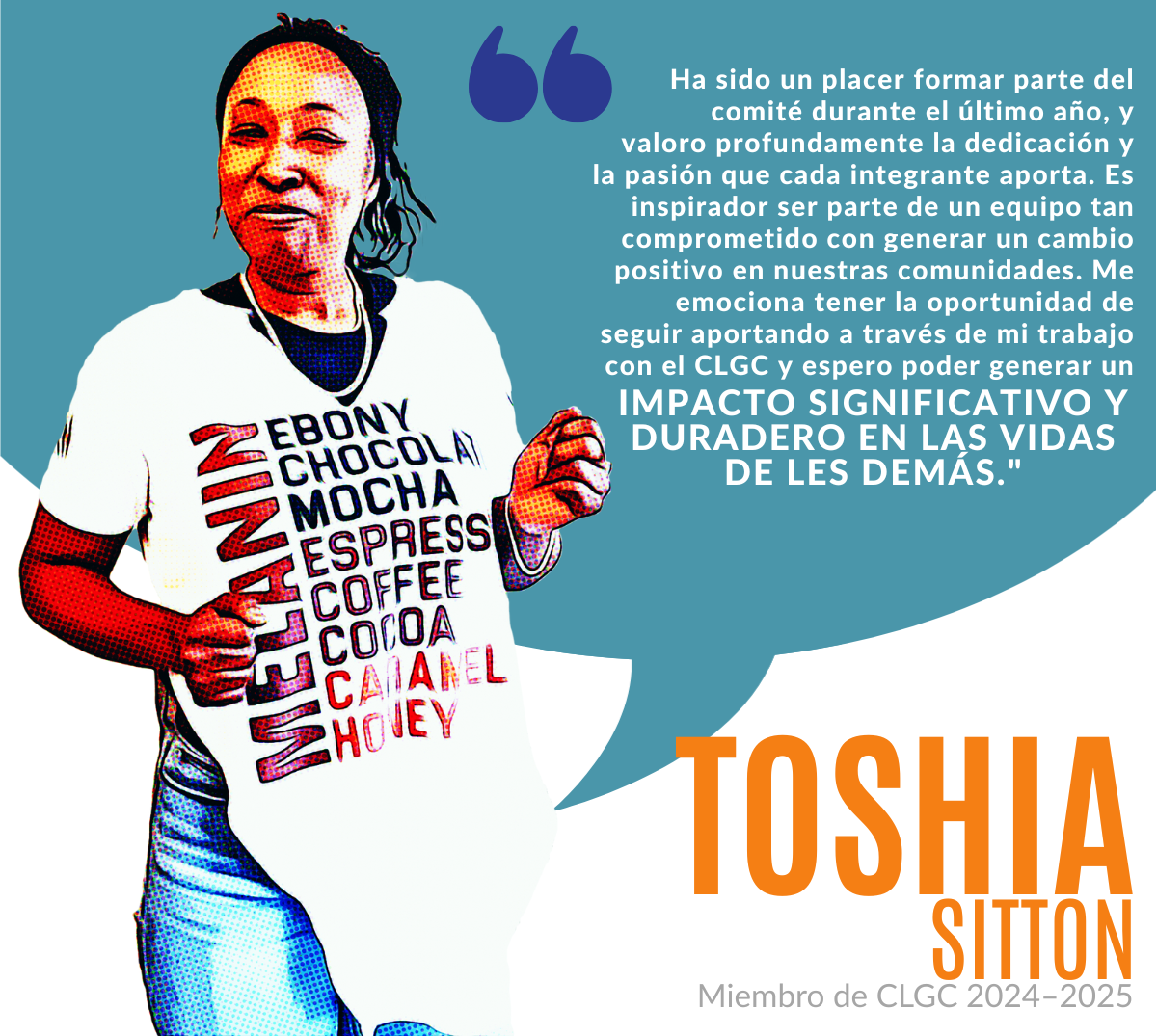
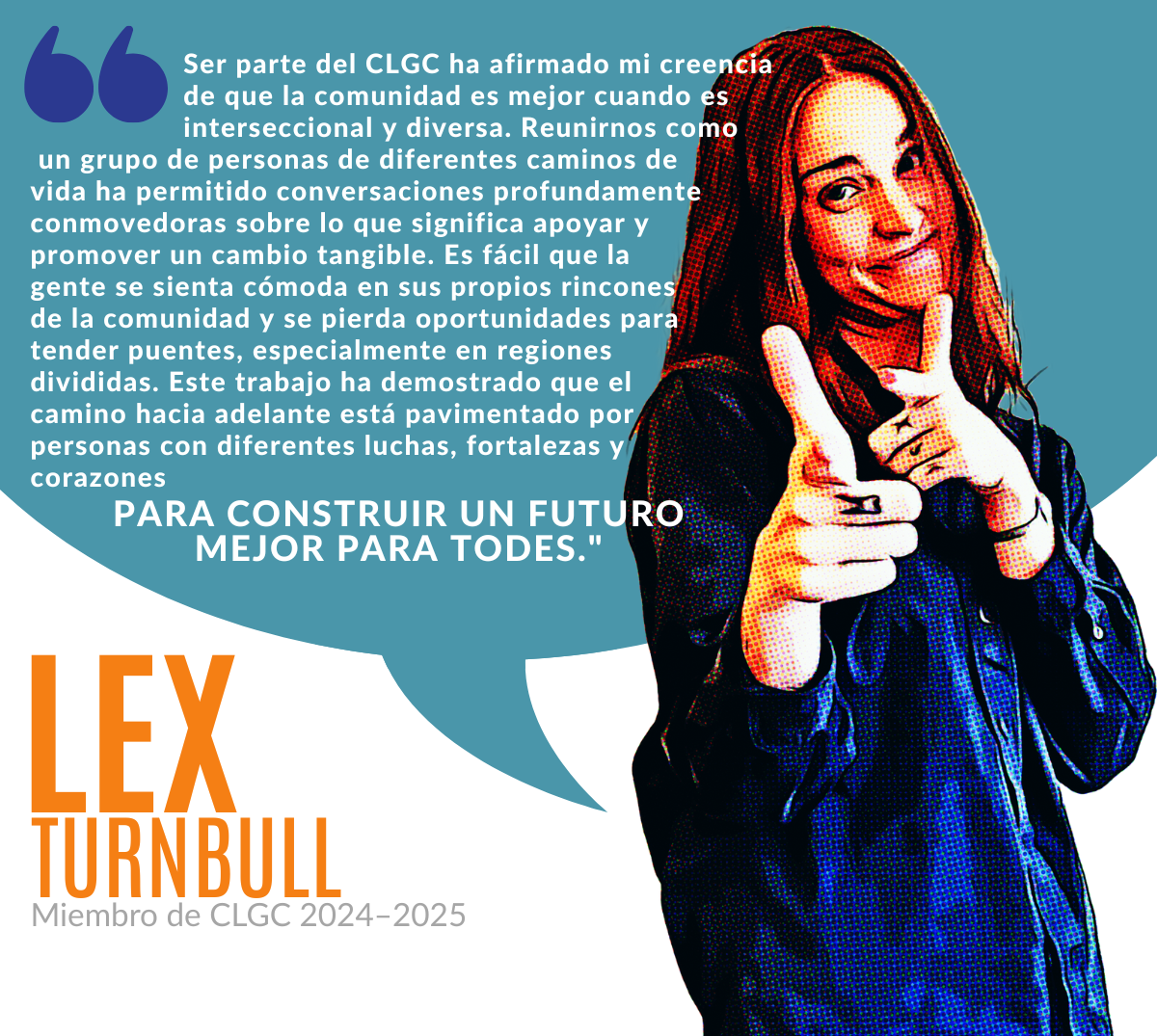
En el futuro, los comités se seleccionarán mediante un proceso que desarrolle el comité anterior.
Conoce el proceso del CLG
El ciclo de poder comunitario de CLG
El Comité 2024-2025 utilizó la Investigación-Acción Participativa (IAP) para determinar a quién y qué financiar. La IAP es un enfoque colaborativo y centrado en la justicia en el que las personas más impactadas por un problema lideran cada paso del proceso de investigación, desde la identificación del problema hasta el desarrollo de soluciones y el impulso del cambio.
¡Haz clic para ver el proceso de IAP del Comité CLG 2025 «El ciclo de poder comunitario» (solo en inglés)!
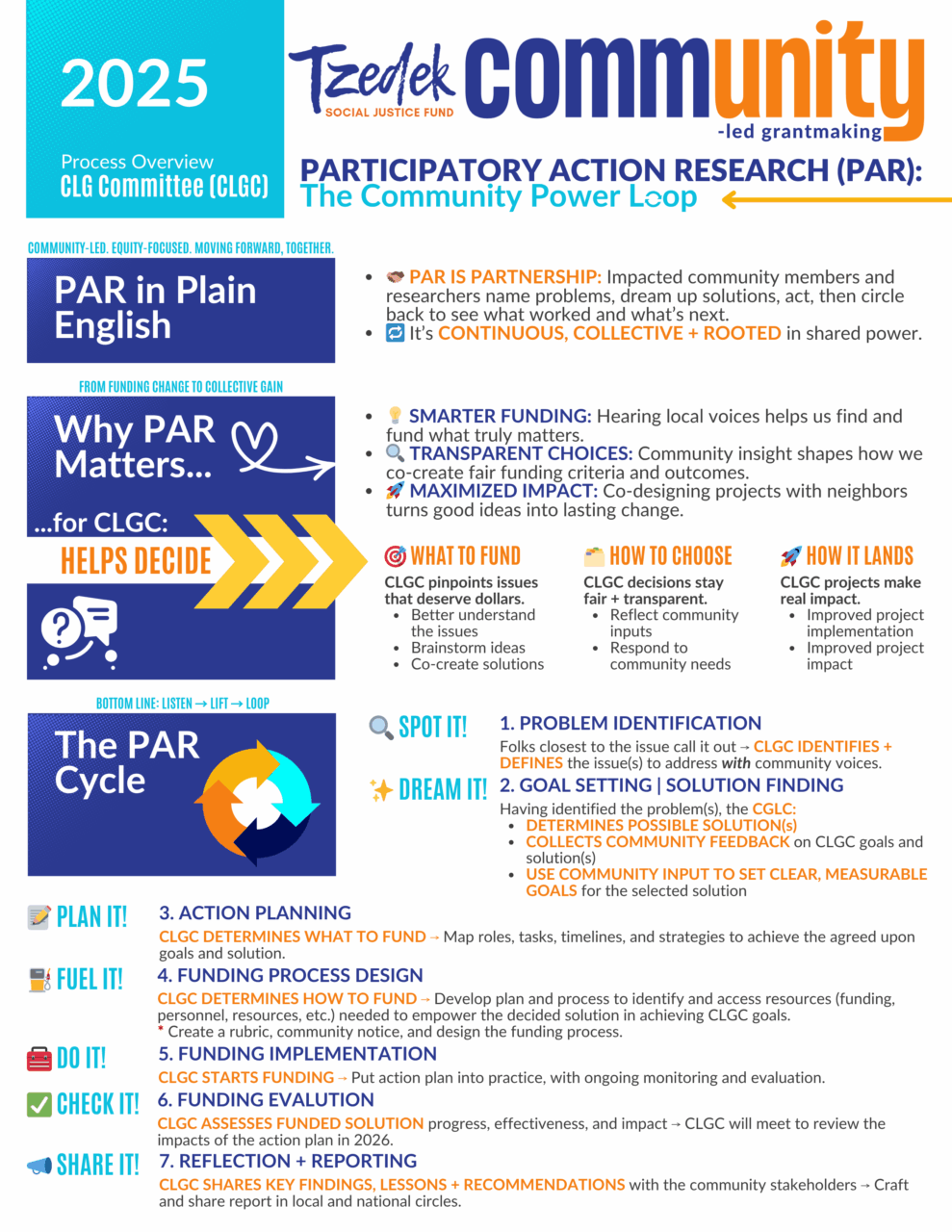
Archivo de actualizaciones de CLG
2024: Financiación de la comunidad en un contexto poscrisis
Flujos de financiación de ayuda para el huracán Helene
El CLGC distribuyó 250 000 dólares para apoyar la asistencia para el alquiler y la justicia medioambiental en el oeste de Carolina del Norte como parte de nuestra respuesta al huracán Helene en 2024. ¡Mira a continuación para descubrir cómo fluyó el dinero hacia la comunidad!
RESUMEN DE LA FINANCIACIÓN DEL CLGC EN 2024
ACTUALIZACIÓN DE FIN DE AÑO DE 2024

El viaje de Tzedek con CLG
CLG 2021–2022

Subvenciones CLG 2021: Lanzamiento del programa
Con la incorporación de Libby Kyles, la primera Directora de Concesión de Subvenciones Dirigida por la Comunidad de Tzedek, al equipo en 2021, un comité de cinco personas distribuyó un total de 250 000 dólares para apoyar a organizaciones comunitarias asociadas que trabajaban por la liberación colectiva en la región de WNC. En la primera ronda se presentaron 28 solicitudes que pedían más de 600 000 dólares en apoyo financiero.
¡Haz clic AQUÍ para ver cómo se invirtió el dinero en la comunidad!
Fondo para la Juventud 2022: Centrándonos en la alegría
En 2022, el primer Comité CLG dedicó tiempo a reflexionar sobre el proceso, identificar aprendizajes clave y actualizar el proceso en respuesta a la retroalimentación de la comunidad. Una vez realizados los cambios, el comité inaugural distribuyó 248 000 dólares adicionales para apoyar espacios y oportunidades positivos, saludables y alentadores para la juventud, centrados en la alegría.
¡Haz clic AQUÍ para ver cómo el dinero impulsó la alegría de la comunidad.
CLG 2024–2025
CLG 2.0
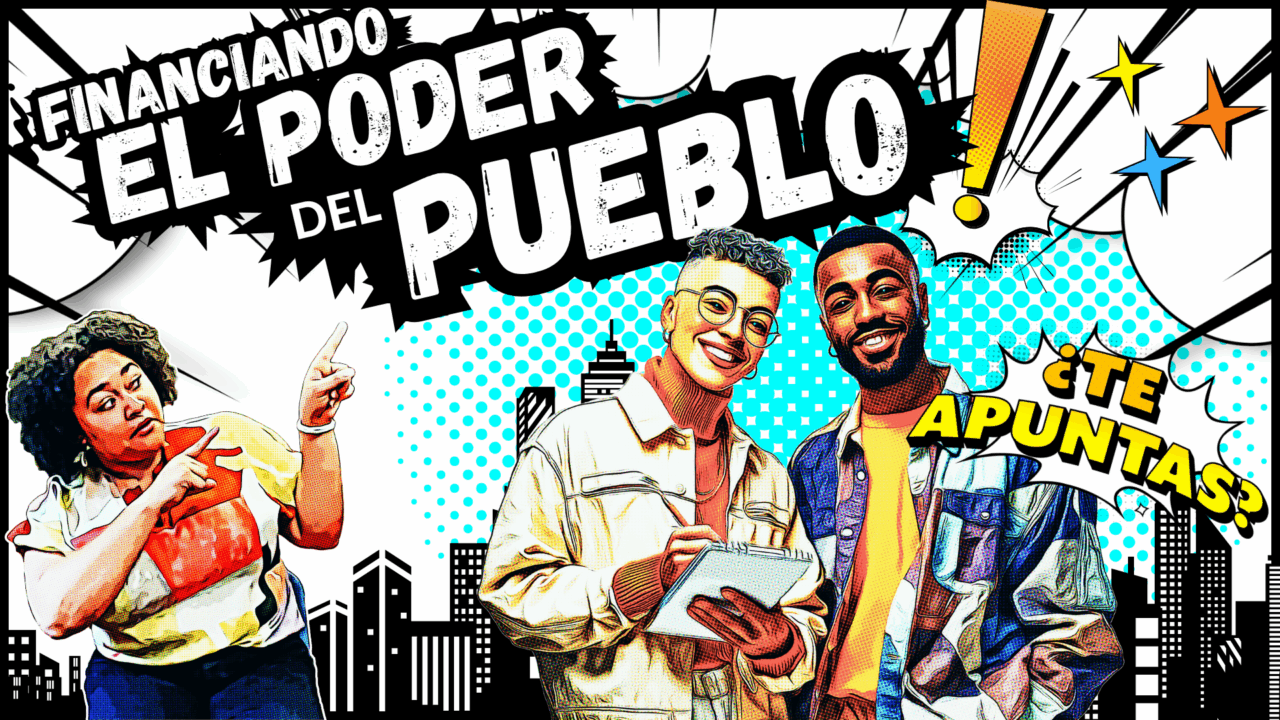
Tras la transición al cargo de Directora Ejecutiva en abril de 2023, CLG se puso en pausa para dar tiempo a contratar a une nueve directore. Tera Coffey, nuestra actual Directora de Concesión de Subvenciones Dirigida por la Comunidad, se incorporó en enero de 2024, impulsando la siguiente fase del enfoque CLG de Tzedek.
En esta segunda iteración del CLGC de Tzedek, nuestro equipo utilizó los aprendizajes de nuestro comité anterior, incluyendo la retroalimentación de les miembres del comité, las mejores prácticas de la concesión de subvenciones participativa y los aprendizajes de nuestras organizaciones comunitarias asociadas. El resultado es un enfoque centrado en la comunidad y liderado por la experiencia vivida de les miembres de comunidades impactades por las opresiones entrelazadas de la injusticia racial, LGBTQ y antisemita.
Reflexión: Aprendizajes e iteraciones de CLG

Preguntas frecuentes
¿Quién decide?
La toma de decisiones con nuestro Comité CLG pone el poder en manos de les miembres del Comité. Tzedek no toma decisiones sobre quién recibe los fondos de CLG, cómo se seleccionan los grupos o el proceso de solicitud: esa es la labor del Comité. En cambio, Tzedek actúa como facilitador de las conversaciones y del proceso durante las reuniones del Comité, asegurándose de que el poder de decisión permanezca firmemente en manos de la comunidad.
¿Qué informes se requieren? ¿Cómo garantiza Tzedek la rendición de cuentas de las organizaciones beneficiarias?
El personal de Tzedek programa una reunión anual con las organizaciones beneficiarias. En función de lo que sea mejor para ellas, las reuniones se celebran por teléfono, videollamada o durante una comida. El objetivo es ver cómo va el trabajo, cómo han cambiado los planes, compartir los retos y celebrar los éxitos. El personal de Tzedek documenta estas reuniones, y estas notas funcionan como nuestros informes de subvención, que son necesarios para que las fundaciones privadas garanticen el cumplimiento legal.
El IRS exige a Tzedek que lleve a cabo la debida diligencia, supervisión y seguimiento en la concesión de subvenciones a organizaciones 501(c)3. Dicha responsabilidad incluye:
- Documentar una consulta previa a la concesión de la subvención (y recibir o colaborar en una propuesta) para confirmar la capacidad y la alineación
- Recopilar un acuerdo de concesión de subvención por escrito
- Llevar un registro anual del trabajo de las organizaciones beneficiarias
- Establecer que la organización beneficiaria lleve el seguimiento de los fondos de la subvención y del presupuesto
